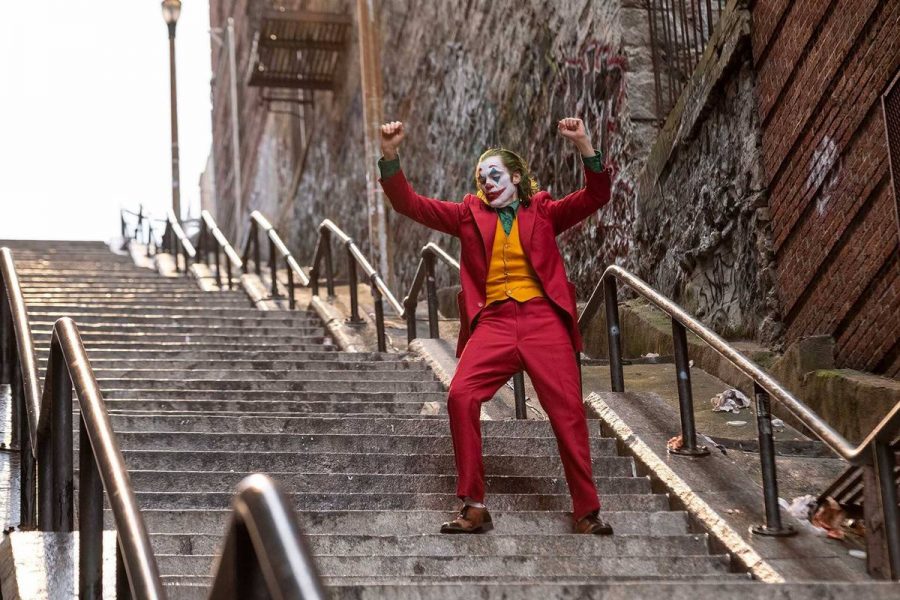“Joker” fails to make meaningful commentary
Photo Courtesy of Warner Bros.
“Joker” was release on Friday, Oct. 4
“Joker” is a confusing movie. Its creators and studio are so assured of its own importance that it can’t be ignored, but it’s so devoid of anything unique that you’ll probably forget you saw it in a few months. Aside from Joaquin Phoenix’s already thoroughly celebrated performance, “Joker” has almost nothing to offer outside of watching the director of the “Hangover” movies try his own version of “Taxi Driver.”
Joaquin Phoenix plays Arthur, a man down on his luck living in Gotham City in the 1980s. Somewhere down the line he dons the mantle of the Joker and… just kind of does nothing with it. That synopsis is indicative of the film’s structure: the first act goes on for what feels like forever, the second act is too short and the climax is just kind of embarrassing. This might’ve been forgiven if the film had something to say or a big thematic question to ask, but it really doesn’t. It just thinks it does.
Like “The Dark Knight Rises,” “Joker” thinks it has a lot to say about mental illness, politics, culture and economics, but none of it really hits. It’s all shouted incoherently at you with not enough focus on any one thing. There’s not much said about the economic situation of the city, as the film comes down on neither the poor and impoverished nor the upper-middle class. People complain about economics, but they’re wearing clown masks as they shout about it. Are we really supposed to take the side of a group of people who have rallied behind a psychotic clown? Arthur is diagnosed with several mental illnesses and when the government cuts off funding for his psychiatric services, he’s no longer able to get his medication. That would’ve been decent commentary on government spending on mental illness, but the choice of time period makes the point confused. It’s set in the 1980s, three decades ago, which makes it difficult to connect with any present issues of mental illness. And even if it was set in modern day, it’s difficult to remember the last time government funding for mental health was a hot topic that a wide audience could relate to.
Perhaps that’s why the film is considered dangerous; not because of what it says but because it says nothing at all. It’s the film equivalent of a high schooler screaming obscenities about politics on their live journal. There’s no structure, nothing coherent. It’s just an acidic spew of anger and angst that can only be understood by those who feel the same way. It pulls out visual references to Occupy Wall Street, Donald Trump, “The Killing Joke,” Martin Scorcese and dozens of other recognizable cultural staples and just has them there. If the iconography were actors in the film, they’d be the ones who weren’t even cast, but they wandered drunkenly onto the set and the director decided to film around them anyway.
The film probably would’ve been better without the barely-there comics connection because the character of the Joker just doesn’t fit into this story. Typically, the Joker is a constantly charismatic psychopath, so enjoyable to watch that you almost resent whenever he’s not in a scene. He’s energetic, darkly comical and deviously intelligent. The character presented in this film, however, is a joyless angst machine that couldn’t lead ducks to a pond. The only time we see any sign of the classic Joker persona is a chase scene about an hour and a half into the film. We see him evade the police by going through a crowd of other people in clown masks. And when the clown protesters beat the officers into unconsciousness, the Joker does a little dance of joy before tossing his own clown mask in the garbage. For those blissful six minutes the movie deigns to have some semblance of fun and it represents a golden opportunity the film didn’t realize was there.
In the film, Arthur is inadvertently responsible for a clown-themed Occupy movement–yet more incendiary imagery that’s just kind of there–of other insecure, down-on-their-luck people that feel like they’ve been left behind by society. This is prime material for media meta commentary. The Joker as a character has accrued an online fan base who feel drawn to the philosophies presented through “The Killing Joke” and “The Dark Knight.” They also feel that the world is unfair and that society is just one day away from toppling in on itself. “Joker,” whether it realizes it or not, has set up an opportunity for fans of the character to look at themselves in the mirror, to see themselves as the screaming people in clown masks who are willing to follow a dangerous, pathetic sociopath as long as their own feelings of oppression and moral superiority are justified.
Unfortunately, like every other thematic thread in the film, it’s not explored nearly enough and it lands with all the impact of a Jimmy Fallon punchline.
“Joker” is going to be one of the biggest talking points in film for the rest of the year, whether it deserves that mantle or not. It is both a groundbreaker and a trend follower, a work of great effort and thought and a piece of lazy storytelling. It’ll have rabid fans and equally rabid detractors. Its own insistence to remain in the public consciousness will carry it even into the next year. For better and worse. Mostly worse.








